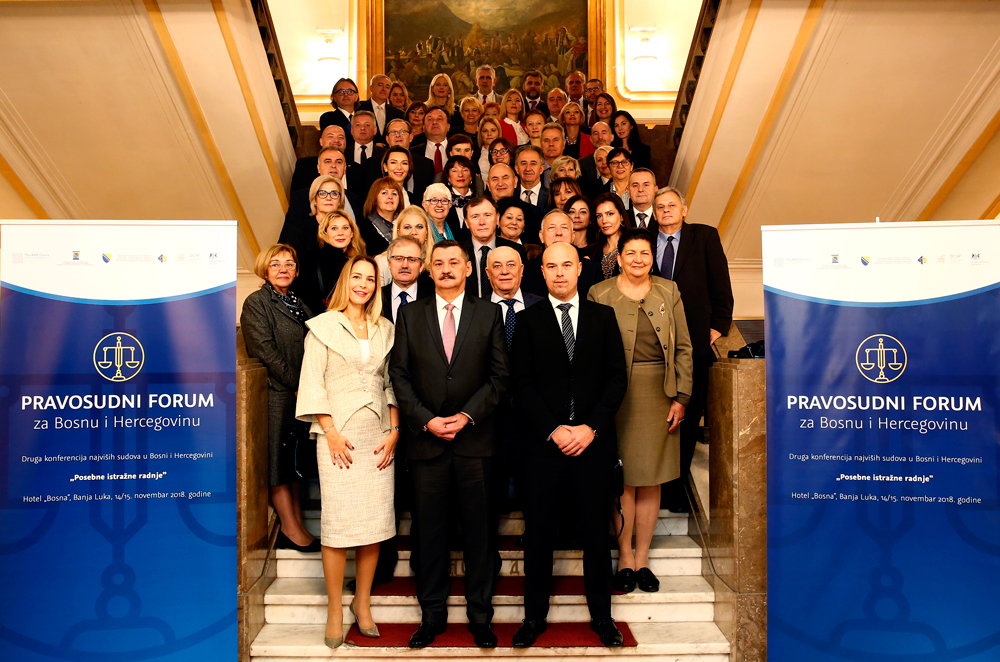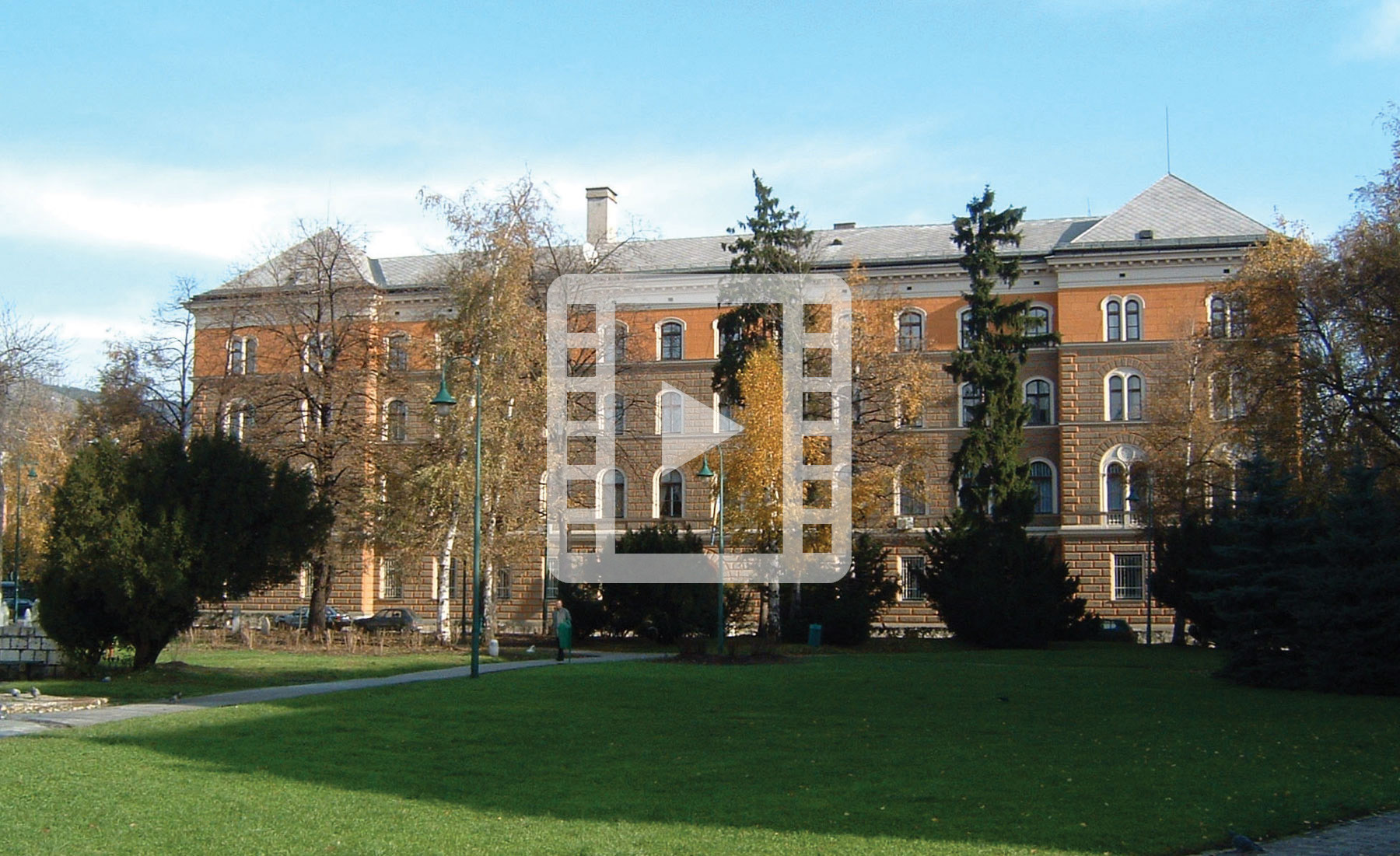Banja Luka, 15 November 2018 – The Constitutional Court of Bosnia and Herzegovina and the AIRE Centre (Advice on Individual Rights in Europe), as co-organisers, in cooperation with the High Judicial and Prosecutorial Council of Bosnia and Herzegovina and Geneva Center for the Democratic Control of Armed Forces (DCAF) have organised the Second Annual Conference of the Highest Courts in Bosnia and Herzegovina within the Judicial Forum for Bosnia and Herzegovina held in Banja Luka on 14 and 15 November 2018.
The Conference was organized with a view to creating conditions for improving a practical application of the European Convention on Human Rights, and focused on the standards of the European Court of Human Rights related to the rights guaranteed by Articles 6 and 8 of the European Convention on Human Rights, in the context of special investigative actions.
The President of the Constitutional Court of Bosnia and Herzegovina Zlatko M. Knežević expressed his gratitude to the organisers and participants of the Judicial Forum stressing the following: Boundaries between protected goods (in the criminal area) and violations of fundamental human rights are nowhere so, I would say, flexible, and perhaps this topic is one of the few where, in addition to the typical judgment as established ‘judicial truth’, the complexity of the judge's profession is most evident. The most complex decision of criminal proceedings to be made prior to the final adjudication, is when and to what extent a human being should be deprived of privacy or when and to what extent his privacy should be limited in order to protect 'the greater good'.
The application of special investigative actions is very important, as it is a powerful tool in proving criminal offences, primarily organised crime, while their excessive use can be extremely damaging to the stability of the legal system, explained Mr. Milan Tegeltija, the President of the High Judicial and Prosecutorial Council of Bosnia and Herzegovina. In his speech at the opening of the conference, Mr. Tegeltija stated: It gives me a great pleasure to be here and have the opportunity to listen to eminent experts on the challenges of the judiciary of Bosnia and Herzegovina because of the use of special investigative actions in the process of establishing criminal responsibility for the most serious crimes. In addition, we will have the opportunity to give our contribution to the Forum, through the conclusions of the Conference, as to the dilemmas of the judicial community as to this issue.
As to the use of special investigative actions, which are an important tool in the fight againstorganized crime and corruption, and in protecting national security, Ms. Biljana Braithwaite, AIRE Centre Western Balkans Programme Manager, pointed out the following: „The fight against organized crime and corruption is a key condition for significant advances in the rule of law area, but it must also include respect for fundamental rights, such as freedom, security, privacy and the right to a fair trial. Otherwise, the legitimacy of such a fight can be compromised. It is precisely through the application of the case-law of the European Court of Human Rights in Strasbourg that we can secure compliance with these rights in the best possible way and, at the same time, strive for both efficiency and fairness.”
Teodora Fuior from DCAF Geneva stated that judicial authorization of the use of intrusive methods for information collection is one of the strongest safeguards for human rights and the rule of law, being at the core of effective accountability systems. She underlined that „accomplishing this task is today a big challenge for judges in all democratic states. Judges act as arbiters of government secrecy and individual freedoms in a very powerful way. They determine the delicate balance between democracy and security, which is at the core of our discussion today.”
A Guide on the Right to Reasoned Judgment was presented at the Second Annual Conference of the Judicial Forum. The Guide is a result of recommendation of the First Annual Conference entitled „The Right to Reasoned Judgment - Mandatory Standard in Court Proceedings”, which took place on 6 and 7 November 2017. The team of judges of the Constitutional Court of BiH and domestic and international consultants led by Mr. Mirsad Ćeman, the Vice-President of the Constitutional Court of Bosnia and Herzegovina, have prepared this guide that will be distributed to the judicial community in Bosnia and Herzegovina.
The Conference was attended by 60 eminent representatives of the highest judicial institutions in Bosnia and Herzegovina: the Constitutional Court of Bosnia and Herzegovina, the High Judicial and Prosecutorial Council of Bosnia and Herzegovina (HJPC BiH) and the Secretariat of the HJPC BiH, the Constitutional Court of the Federation of Bosnia and Herzegovina, the Constitutional Court of the Republika Srpska, the Court of Bosnia and Herzegovina, the Supreme Court of the Federation of Bosnia and Herzegovina, the Supreme Court of the Republika Srpska, the Appellate Court of the Brčko District of Bosnia and Herzegovina, the Judicial Commission of the Brčko District of Bosnia and Herzegovina, Centers for Education of Judges and Prosecutors in the Federation of Bosnia and Herzegovina and Republika Srpska as well as domestic and international legal experts in the human rights field.
The BiH Judicial Forum was organized with the assistance of the British Government with a view to improving the implementation of the European Convention on Human Rights and Fundamental Freedoms and supporting Bosnia and Herzegovina's judicial system preparing for the European integration.




